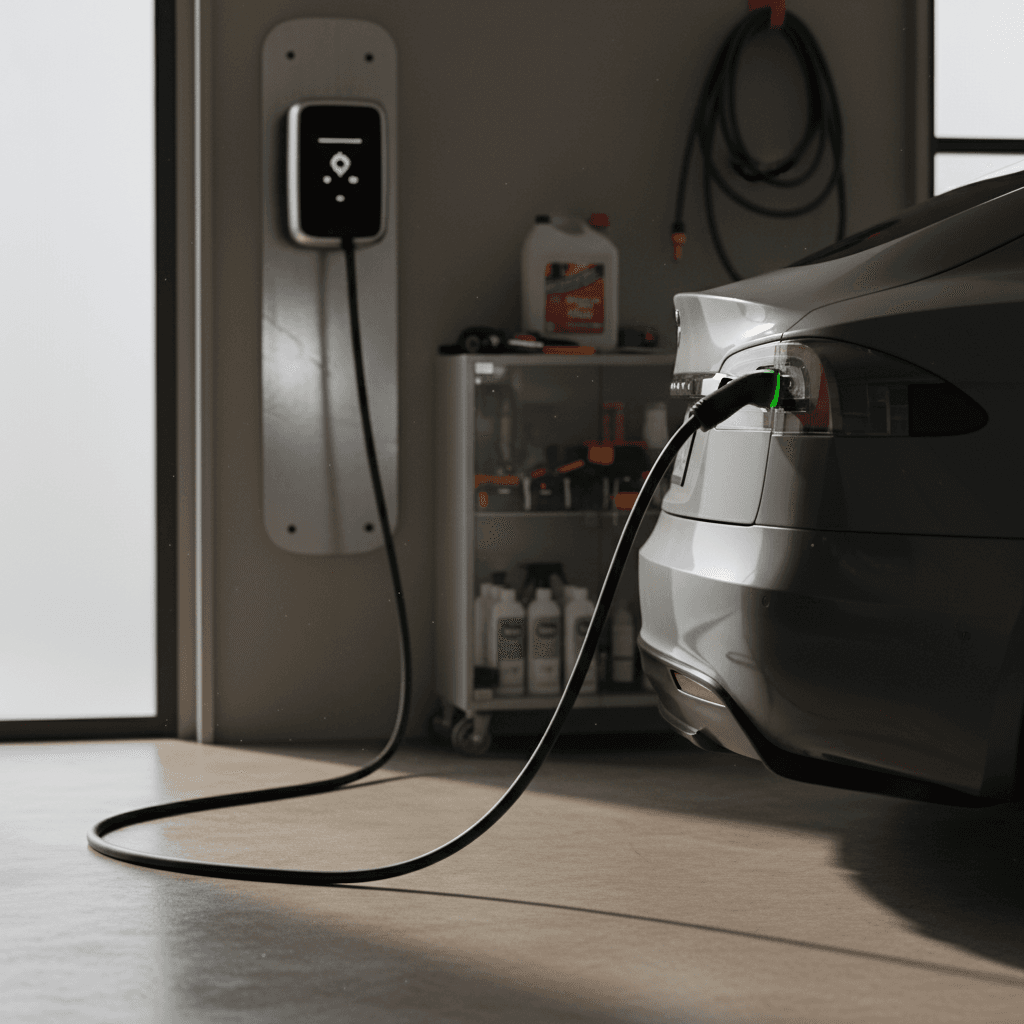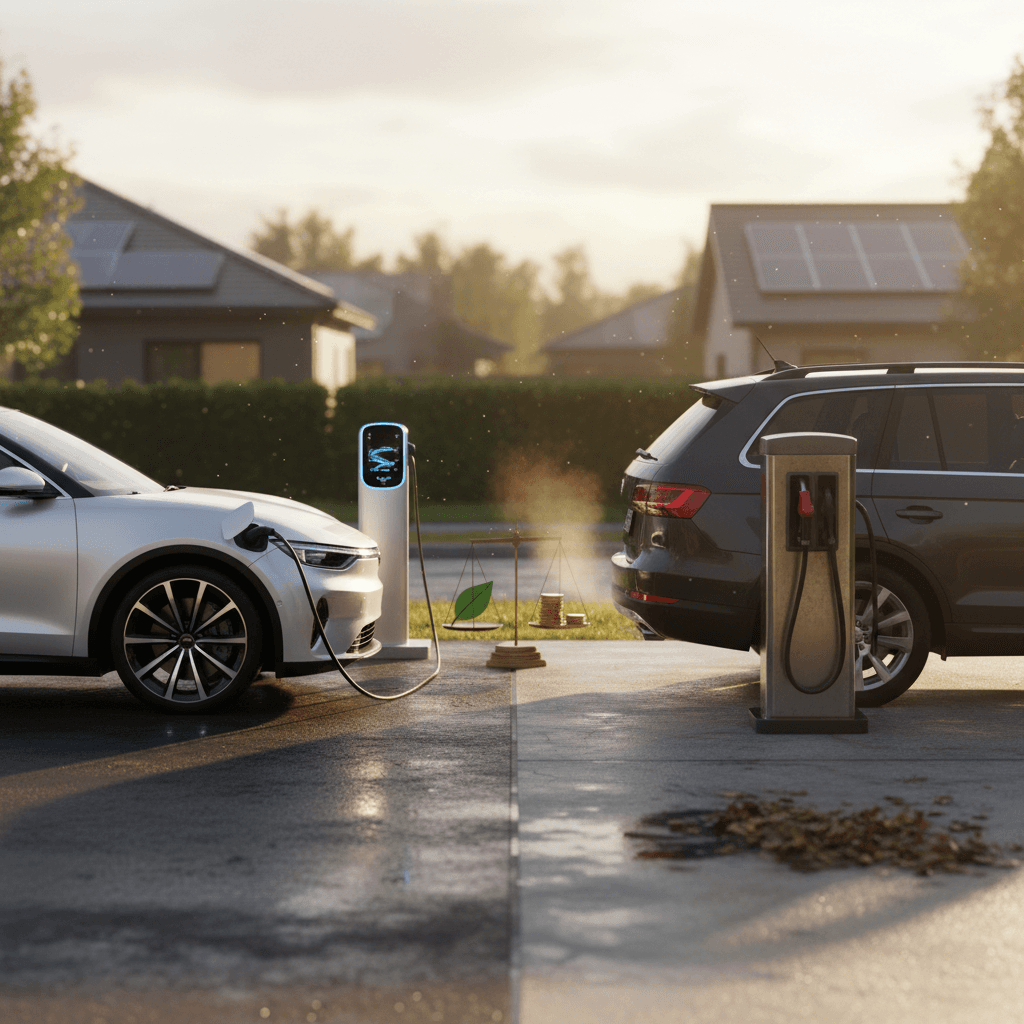You’re not alone if you’re asking, “Should I buy an EV?” In 2025 the answer is more nuanced than “yes, they’re the future” or “no, they’re too expensive.” EV prices have dropped, incentives have shifted, battery tech has improved, and used EVs are suddenly some of the biggest bargains on the lot, if you know what you’re looking at.
EV adoption is growing, but has hit a pause
“Should I Buy an EV?” The Quick Answer
An EV probably does make sense if:
- You drive at least 8,000–12,000 miles per year.
- You can install Level 2 home charging (240V) or have reliable workplace charging.
- You plan to keep the car for 5+ years.
- You mostly drive in-town or regional trips, with only a few long road trips per year.
- You’re open to a used EV to avoid new‑car depreciation.
An EV might not be the best move (yet) if:
- You can’t charge at home, and public chargers near you are sparse or unreliable.
- You drive very little (under ~6,000 miles/year), so fuel savings are small.
- You live in an area with very high electricity rates and cheap gas.
- You tow or haul heavy loads long distances regularly.
- You’re planning to keep the car only 2–3 years and are sensitive to resale swings.
Shortcut decision
How EV Costs Really Compare to Gas Cars
When you ask whether you should buy an EV, what you’re really asking is, “Will this cost me more or less than a gas car, and over how long?” In 2025, the answer is: for many models, total five‑year costs are now very close, and about 40–45% of EVs are already cheaper to own over five years than their gas equivalents when you factor in fuel, maintenance, and incentives.
EV vs Gas: Key Cost Signals in 2025
Upfront price vs long‑term cost
New EVs still tend to carry a higher sticker price than equivalent gasoline models, although the gap has narrowed as EV prices have fallen and discounts have grown. On the flip side, electricity is much cheaper per mile than gas, and EVs need less routine service. Over a five‑year window, the average EV and its gas twin may now land within a few hundred dollars of each other in total cost for many typical U.S. drivers. The winner depends heavily on your mileage, local electricity and gas prices, and available state or utility incentives.
Don’t ignore depreciation
Where a used EV can shine
Because many first‑owner EVs have already absorbed the steepest depreciation, buying used can tilt the numbers. A three‑year‑old EV with a healthy battery can deliver most of the benefits, low fuel and maintenance costs, at a monthly payment closer to a mainstream gas car. This is exactly the niche Recharged focuses on: used EVs with verified battery health, transparent pricing, and expert support so you’re not guessing about long‑term costs.
Do EV Batteries Wear Out Too Fast?
Battery life is the deal‑breaker question for a lot of shoppers. Nobody wants to buy a used EV only to face a five‑figure battery replacement bill a couple of years later. The good news: modern EV batteries are aging more slowly than many people assume.
What Recent Data Says About EV Battery Life
Why degradation matters less than you think
How to judge a used EV’s battery
With a gas car you might pay a mechanic to check compression and leaks. With an EV, you also need to know the battery’s actual state of health. That requires more than just looking at a range estimate on the dash. You want data, how the pack has aged, how it was charged, and whether any cells are out of line.
Where Recharged fits in

Charging at Home vs Public Stations
The right answer to “Should I buy an EV?” often hinges on a simpler question: Where will I charge it most of the time? If the answer is “at home,” you’re in the EV sweet spot. If the answer is “I’m not sure,” you’ll want to pay closer attention.
Home charging (best‑case scenario)
- Plug in overnight, wake up to a “full tank” almost every morning.
- Level 2 (240V) charging typically adds 20–40 miles of range per hour.
- Electricity rates at home are usually much cheaper than public fast charging.
- Simplifies life, no special trip to a station just to “fuel up.”
If you own your home and can install a 240V outlet or wallbox in your garage or driveway, this is the single strongest argument in favor of buying an EV.
Relying on public charging
- Great when it works, frustrating when stations are busy or offline.
- Fast charging is ideal for road trips, but more expensive than home charging.
- Day‑to‑day life can feel complicated if you’re frequently waiting on chargers.
- Networks vary widely in reliability from region to region.
If you rent and can’t add home charging, look closely at workplace chargers, local rapid‑charging hubs, and how crowded they are at the times you’d actually use them.
Apartment and city living
Who Should Buy an EV Right Now, and Who Should Wait
Ideal EV Buyers vs Better Off Waiting
Match your situation before you sign anything
Great EV candidates
- Homeowners with a garage or driveway.
- Drivers with commutes under ~60 miles each way.
- Households with two cars (one can be EV, one gas).
- People who keep cars 6–10 years.
- Shoppers comfortable buying used with good data.
Maybe wait or choose PHEV
- High‑mileage road‑warriors in rural areas with sparse fast‑charging.
- Frequent heavy towing or hauling long distances.
- No control over parking or charging, and little public infrastructure.
- Very low‑mileage drivers who won’t benefit from fuel savings.
- Shoppers who swap cars every 2–3 years and worry about resale swings.
Where used EVs shine for value seekers
New vs Used EV: Which Is Smarter in 2025?
New EV vs Used EV in 2025
How the trade‑offs look for most U.S. shoppers right now
| Factor | New EV | Used EV (2–5 years old) |
|---|---|---|
| Sticker price | Highest, though discounts are growing | Much lower, biggest depreciation already taken |
| Incentives | Sometimes eligible for new‑car credits or special leases | Often benefit from lower prices more than formal credits |
| Battery health clarity | Covered by factory warranty, but long‑term aging unknown | Real‑world aging already visible; needs proper diagnostics |
| Features & tech | Latest range, safety, and infotainment | Slightly older tech, but often still very competitive |
| Financing | Similar to new gas vehicles | Rates can be higher unless lender understands EVs |
| Risk profile | More exposure to future resale swings | Lower buy‑in, especially via trusted used‑EV platforms like Recharged |
In many cases, late‑model used EVs offer the best balance of price, tech, and battery life, if you have transparent data on pack health.
How to choose
Common Concerns: Range, Resale, Winter Driving
Top EV Concerns, And What Actually Matters
Range, resale, and cold‑weather behavior, in plain English
Real‑world range
Resale value
Winter performance
Don’t buy an EV on promises alone
Step-by-Step “Should I Buy an EV?” Checklist
Your 8‑Step EV Decision Process
1. Map your real driving patterns
Look at a typical week. How many miles do you drive per day? How often do you go over 150 or 250 miles in one shot? Actual numbers beat guesses when you’re thinking about range.
2. Check your home charging options
Do you have a garage or driveway with access to electrical service? Can you add a 240V outlet or wall charger? If not, what workplace or public charging can you realistically rely on?
3. Compare local electricity and gas prices
Check your utility’s kWh rate and your local gas prices. If electricity is relatively cheap and gas is high, an EV’s fuel savings will be more compelling. If the opposite is true, run the math carefully.
4. Decide how long you’ll keep the car
Planning to keep the vehicle for 6–10 years? Long‑term fuel and maintenance savings become more important. Planning to flip it in 2–3 years? Resale and lease terms matter more.
5. Set a clear budget, including incentives
Look beyond MSRP. Factor in state or utility rebates, registration fees, insurance, and the cost of installing home charging. A used EV with a fair price and strong battery can often fit a tighter budget than a new one.
6. Shortlist 2–3 EVs and 2–3 gas equivalents
Pick realistic comparisons, similar size, performance, and equipment. Then look at total cost of ownership, not just monthly payment. Many cost calculators now include EV options alongside gas.
7. Test drive both EV and gas options
Feel the differences, instant torque, one‑pedal driving, quieter cabins. Also pay attention to fast‑charging speed, seating comfort, and infotainment. Make sure the EV feels like an upgrade in daily life, not a compromise.
8. For used EVs, demand real battery data
Ask for a battery‑health report, not just a visual inspection. With Recharged, every used EV comes with a Recharged Score that shows verified battery health, fair‑market pricing, and expert notes so you can buy with eyes wide open.
Frequently Asked Questions About Buying an EV
EV Buying FAQ
Bottom Line: Should You Buy an EV?
If you can charge at home, drive a typical mix of city and highway miles, and think in terms of total cost rather than just sticker price, buying an EV in 2025 is increasingly a smart, defensible decision. The fuel and maintenance savings are real, batteries are aging better than early skeptics predicted, and used EVs in particular are emerging as strong value plays.
If, on the other hand, you have no reliable way to charge, drive very little, or simply aren’t comfortable with today’s charging network and resale uncertainty, it’s reasonable to wait, or to consider a plug‑in hybrid as a bridge. The key is that your decision should be rooted in your life and your numbers, not in hype.
When you’re ready to explore specific cars, Recharged is built to make that process simpler. You can browse used EVs online, review each vehicle’s Recharged Score battery report, compare pricing, and lean on EV‑savvy specialists who do this all day. Whether your answer today is “yes,” “not yet,” or “maybe used instead of new,” you’ll have the data and support to make the call with confidence.

